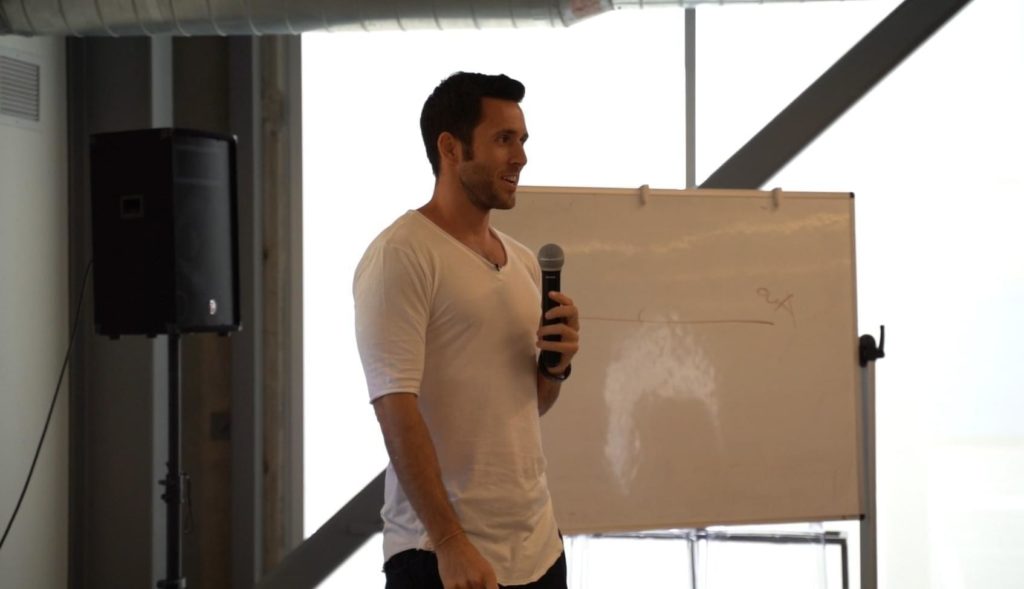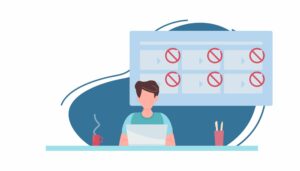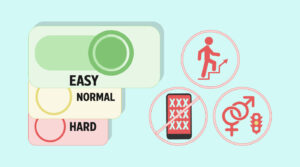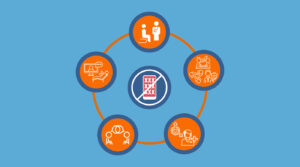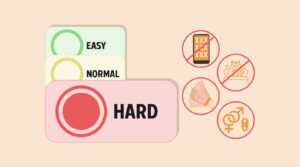While not fully recognized by traditional medicine, pornography addiction negatively impacts people’s lives and is becoming more prevalent. In response to this, there exist pornography rehabs, organizations, and programs specifically for porn addiction treatment.
While it may seem like society and culture sweep porn addiction under the rug, one can find many forms of health and human services aimed directly at porn addiction treatment. It just requires a little looking, and you may be surprised by the type of community you’ll find.
The term “porn rehab” can seem like a loaded word, so let’s first understand the definition of ‘rehabilitation’ according to Oxford.
Rehabilitation: (noun)
The action of restoring someone to health or normal life through training and therapy after imprisonment, addiction, or illness.
Rehab within the context of pornography addiction supports someone through their return to everyday life, free from the physical, mental, and social symptoms of porn addiction.
From that juncture, porn rehab is any place, program, community, therapist, or form of support in overcoming porn addiction.
Pornography rehab can range from an all-inclusive retreat or an online community, from a weekly individual therapist appointment to daily support group meetings.
With that idea in place, let’s get into the types of porn rehabs and treatments.
Types of Pornography Rehabs

Inpatient/Residential Rehab
The distinction here is that you stay full-time at the facility providing treatment. As far as inpatient pornography addiction-specific rehabs are concerned, some do not accept insurance. These are more like retreats and are privately owned. Unless you can afford to stay at a retreat-style pornography rehab, inpatient treatment may not be the best choice. But it is also not required to overcome porn addiction. Most inpatient treatments will range from 7 days to one month.
Presenting only pornography addiction, it can be hard to get insurance to cover inpatient treatment. If co-occurring issues are at play, it becomes a different story. Insurances can cover inpatient treatment for drug and alcohol use disorders or mental health disorders. While in inpatient drug or mental health treatment, therapy providers can also aid in addressing porn addiction.
Outpatient Rehab
For outpatient pornography addiction treatment, there exists two categories: IOP or Intensive Outpatient and OP or Outpatient. The main difference is the number of clinical hours per week. IOP is usually around nine clinical hours, and OP is typically between 3-5 clinical hours. Depending on the program, these clinical hours consist of individual therapy, support groups, learning about porn addiction, and more.
Outpatient porn addiction treatment is more feasible to be covered by insurance than inpatient treatment. The programs may not be specifically focused on porn addiction but more generally focus on compulsive sexual behavior disorder. Porn addiction does, however, fall under CSBD and can be treated as such.
Individual Therapy

While not technically a “rehab,” individual therapy alone can rehabilitate someone dealing with porn addiction. Therapy ideally takes place with a sex-focused therapist but does not have to. It can be extremely helpful to talk to someone about what led you to such pornography consumption—the stresses, self-beliefs, desires, and so on. Most times, other life factors play a role in porn addiction and addressing them can aid porn addiction treatment.
Compared to Inpatient and Outpatient, individual therapy with licensed professionals for porn addiction alone will be easier to get covered by insurance. It will also be more affordable to pay out of pocket should insurance not cover it.
And while a general therapist can be helpful, someone specializing in sex and sexual addictions can be more effective as they are experienced, trained, and even certified. Having someone like this in your corner treating porn addiction is akin to a boxer having a coach.
Certified Sexual Addiction Therapists
The first notable thing to look for in seeking individual therapy for pornography addiction is a CSAT, a Certified Sexual Addiction Therapist. CSAT is a certification by the International Institute for Trauma & Addiction Professionals. It requires training as well as continued education. The necessary credential to apply is being a fully state-licensed counselor, social worker, therapist, psychiatrist, or psychologist. Other required credentials are a Master’s Degree or higher and a minimum of five years of clinical counseling experience.
AASECT Certified Sex Therapists
The American Association of Sexuality Educators, Counselors, and Therapists is another entity that certifies sex therapists. The requirements are similar to a CSAT, and the certification only differs because it is not specific to sexual addictions. However, this certification certainly means the individual can help those with pornography addictions more than other therapists.
The important takeaway is that while it may be difficult to find a therapist specializing in porn addiction specifically, there are certainly sex and sexual addiction therapists. Seeking a CST or CSAT is an excellent direction in searching for a therapist to overcome porn addiction.
Online Therapy
Online therapy is what it sounds like, therapy but remotely without visiting a therapist’s office. Many sites, such as BetterHelp or TalkSpace, can connect you with a licensed therapist. Appointments will be via a video call or sometimes audio if you prefer. Online therapy can be more affordable than in-person therapy and convenient or accessible. It can be easier to find a sex-specialized therapist online than locally, depending on where you live. There are also online programs, paid courses, and apps like porn blockers for your browser, which one can use in conjunction with online therapy.
Non-clinical
Many other organizations and communities can go very far to help anyone dealing with pornography addiction not to feel alone, find inclusion, and ultimately recover from their suffering. We’ll describe some types here and have a list of resources at the bottom of the article.
There are communities such as NoFap or RebootNation based entirely on porn addiction recovery. Both have stand-alone websites with forums and articles and are excellent resources.
Another non-clinical option is Sex Addicts Anonymous or SAA, a 12-step-based organization similar to Alcoholics Anonymous. They have in-person meetings as well as a sponsorship program.
There are also religious organizations related to pornography addiction for nearly all faiths, local and online.
There are also hotlines, which can help in a crisis or during a compulsion to consume pornography. They will be listed at the bottom of the article.
Types of Therapy Used in Pornography Addiction Rehab

CBT – Cognitive Behavioral Therapy
CBT is a form of talk therapy and one of if not the most common. Simply put, it addresses your thoughts, beliefs, and attitudes or how you think about a situation. Since your thinking informs your behavior, behavioral changes begin with cognitive changes. The goal of CBT can be stated as to examine and then challenge or change negative thinking patterns. This produces different, less harmful, even positive behavior, according to their client’s goals.
Another way of explaining CBT is that it looks into the meanings we make of our experiences and what we do because of them. Being that our goal boils down to addressing a behavioral addiction and its underlying reasons, CBT is highly effective. CBT has been used as a basis for many forms of talk therapy which aim to treat behavioral addictions developed in recent decades.
DBT – Dialectical Behavioral Therapy
DBT is based on CBT and is used similarly. The main difference is that while CBT examines thoughts to inform behaviors, DBT is more for managing and coping with intense emotions and distress. The D in DBT is for dialectical. Dialectical refers to two opposing viewpoints, where both can be true simultaneously. This aids the client to manage emotional pain.
An example of DBT in action could be feeling a very strong emotion about a situation and acknowledging that the situation isn’t that serious or critical at the same time. DBT balances out one’s perspective by considering multiple perspectives. DBT still has the B for Behavioral and aims to improve one’s behavior to raise their satisfaction in life, just like CBT.
ACT – Acceptance and Commitment Therapy

ACT also stemmed from CBT. It too starts with thoughts and looks toward actions. The main theme of ACT is the acceptance of thoughts or emotions and commitment to taking actions that can produce positive changes in them. There are six core elements to ACT, which are as follows:
- Acceptance – Accepting all your thoughts and emotions, instead of trying to avoid, alter, deny, or demonize them.
- Cognitive Defusion – This involves separating yourself from the thought and feelings, being what observes the thought or feeling instead of being the thought or feeling. You are observing without judgment or labeling a habitual reaction. This act distances you from it and allows you to be you.
- Being Present – This aims to cultivate cognitive defusion as a normal state, akin to mindfulness. It is a natural lack of judgment or desire to change one’s thoughts.
- Self as Context – This idea is that people are more than just their thoughts, feelings, and experiences. The self is separate from those.
- Values – This element redefines one’s values across life’s domains to set up the intention and eventual action to live in those values. These are practiced instead of things like avoidance or denial.
- Committed Action – This sees the values manifest, covering real actions, goals, or changes to one’s life. It brings about positive change by making real all the inner work you’ve done with new, meaningful action aligned with your values.
Other Forms Of Individual Therapy
Other options do exist; there are many forms of talk therapy. Eye Movement Desensitization and Reprocessing, or EMDR, is a form of talk therapy mainly used to deal with trauma. It is a protocol that essentially helps the client reprocess the traumatic event with the supportive help of the therapist.
Exercise, yoga, diet, music therapy, and other holistic therapies can be beneficial for creating and maintaining a new meaningful life. Rehab programs can include skills-building therapy, relapse prevention plans, and educational classes.
Group Therapy Types
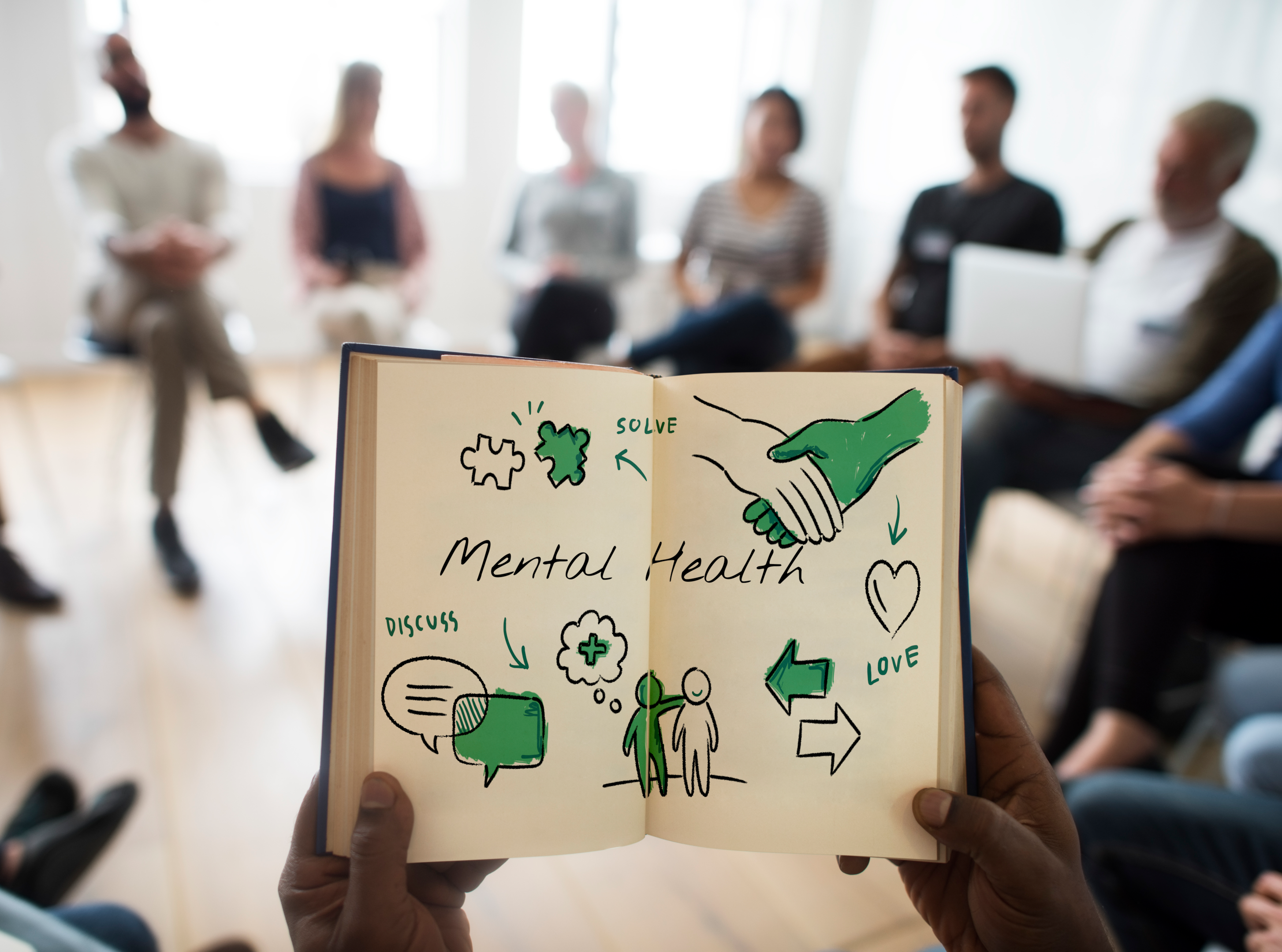
Most outpatient programs will consist of at least one group therapy session or support group. These can be support groups where clients can air their struggles or celebrate their wins and receive support and camaraderie from other clients and facilitators. Skills groups are also commonplace, in which coping skills or cognitive skills are taught to the group.
Group therapy can also occur, which can look like a mixture of support and skills groups. Couples therapy is also an option for those in a relationship. Studies have clearly show that those suffering from a pornography addiction respond positively to psychosocial treatment options. Group therapy goes far to help one to not feel alone, because millions of others have been or are in similar situations.
Is Going to a Pornography Addiction Treatment Center a Must?
The short answer is no, but that is in the strict sense of a rehab-style, inpatient facility. For those only looking for porn addiction rehabilitation, an inpatient program is most often not needed. That said, if one is struggling with drug abuse or underlying mental health issues, inpatient programs can be extremely helpful. It may turn out to be not what you expected, and a refreshing, renewing experience. It may very well change your life.
If your goal is just to treat porn addiction, taking the outpatient treatment route is a massive aid in that goal. Seeking out programs for sexual addiction issues can be the first step. They do not have to be specifically for porn addiction treatment if you are looking for in-person treatment options.
Therapists you would see for individual sessions also don’t need to specialize in porn addiction treatment in order to be able to help. There are however Certified Sex Therapists and Certified Sexual Addiction Therapists (CSTs and CSATs), both of which are well-equipped to treat porn addiction. If you have never been to a therapist or counselor, this may not be necessary, however. Seeing any professional for help with porn addiction and just talking about the stresses of life does wonders to help you work through them.
Beyond those routes, there are the non-clinical options we mentioned. Perhaps even opening up to trusted family members or friends could help. But the one thing that won’t, is doing nothing, making no changes, and taking no action. One doesn’t have to wait until life isn’t tough to be happy.
What Happens After Pornography Addiction Recovery

Once treatment nears its end, it’s time to consider aftercare. Once you’ve sustained abstinence from pornography, it’s about integrating that into your lifestyle. Most programs will have their own recommended aftercare, but you’re also free to define it yourself. It can mean getting involved with online or local communities, continuing to learn, or just making intentional time for self-care. Aftercare also means finding healthy alternatives to pornography and new outlets for stress, frustrations, desires, and boredom.
Aftercare can also mean weekly, bi-weekly, or monthly therapy appointments after going through an outpatient program. Aftercare could also be hitting a weekly Sex Addicts Anonymous meeting to stay connected and give back to new members. These self-driven, self-beneficial acts go far in order to overcome new issues or impulses you experience.
Summary
In the end, pornography rehab shows up looking many different ways. It’s about addressing your individual needs, behaviors, and traumas or reasons you developed the dependence on pornography to begin with. It’s not about getting back to before the pornography addiction; it’s about overcoming it and being better for having done so, becoming a more whole person. It’s about reconciling the part of one’s self that the porn addiction fed, accepting and loving it rather than demonizing or rejecting it.
One difference between drug and alcohol addiction treatment and compulsive sexual behavior disorder-related treatments is the desired outcome. While abstaining from drugs and alcohol for good is the desired outcome of the first, you aren’t expected never to have sex again. The desired outcome of porn addiction treatment is to re-develop a healthy sex life, which enriches your human experience instead of the pornography diminishing it.
All-inclusive retreats are not the most likely path. But that’s not a bad thing. While they are the most expensive, they can be a vacation from real life and access to pornography. Short of those, attending a short-term clinical rehab facility can be greatly helpful for addressing pornography addiction along with co-occurring mental health or drug-related disorders.
Outpatient and Intensive Outpatient programs are also highly effective for those who can’t commit to an inpatient or don’t see a need for it. And last but certainly not least, individual counseling and therapy can often be all it takes to reframe one’s perspective and make positive changes in one’s life. Beyond those clinical options is the massive amount of communities created with the sole focus of healing pornography addiction. They offer societal and cultural support to benefit individuals and the world, and you can become a part of that.
Resources
Treatment Center Finders
Psychology Today offers one of the best services to find treatment centers, therapists, online therapy, support groups, and psychiatrists. They cover many needs, including sexual addiction. You can search based on location, insurance, inpatient or outpatient, and more.
Luxury Rehabs provides a service to search for the all-inclusive retreat style of pornography rehabs. Some may accept insurance, but it’s rare.
One can also find pornography-specific rehabs on Google by searching for ones in your city or state. Contacting your insurance is another option to obtain a list of in-network providers.
Therapist Finders
The aforementioned Psychology Today has the option to look for sex therapists specifically.
The International Insitute for Trauma & Addiction Professionals similarly offers a search tool for their Certified Sex Addiction Therapists.
The American Association of Sexuality Educators, Counselors, and Therapists offers a directory of their Certified Sex Therapists.
Online Therapy
There are many online therapy resources and providers. Here is a quick list:
- TalkSpace offers subscription-based therapy services, including messaging and live calls.
- BetterHelp is similar to TalkSpace, offering weekly sessions and messaging with a therapist.
- Cerebral follows suit with the previous two in addition to prescribing medications.
- ReGain is a service providing online therapy exclusively for couples.
Online Communities
NoFap is perhaps the largest or most popular community-based porn recovery website. They have an informative website, forum, apps, and articles. In their own words: “We offer all the tools our users need to connect with a supportive community of individuals determined to quit porn use and free themselves from compulsive sexual behaviors. NoFap helps our users overcome their sexual addictions so they can heal from porn-induced sexual dysfunctions, improve their relationships, and ultimately live their most fulfilling lives.”
Reboot Nation describes itself as a porn addiction and porn-induced sexual dysfunction recovery community. They help people reboot their brains with encouragement and education. They define reboot as a complete rest from artificial sexual stimulation (i.e., pornography). Their website features a forum as well.
12-Step Meetings for Sexual Addictions
SAA is a 12-step-fellowship community similar to Alcoholics Anonymous. You can find an in-person sexual addiction recovery meeting near you via their website. They also offer telemeetings via phone and video meetings.
There are actually five 12-step meeting organizations, which can be found here. Some may be more or less available in your area.
Hotlines
Sex Addicts Anonymous offers a hotline during their business hours of 10 AM-6 PM Central Time. You can also get information and leave a message during non-business hours.
Call: 1-800-477-8191
Substance Abuse and Mental Health Services Administration’s (SAMHSA) National Helpline is the best option for 24/7 help with addiction-related issues and crises, including pornography addiction. They can also help find treatment.
Call: 1-800-662-HELP (4357)
Other Resources
Your Brain On Porn is a great starting point for educating yourself on the severity and mechanics of pornography addiction.
Brain Chemicals and Porn: How Porn Affects Your Brain is an article by Covenant Eyes detailing the psychological effects of pornography.
Covenant Eyes is one of the top porn blockers and screen accountability software.
Table of Contents

